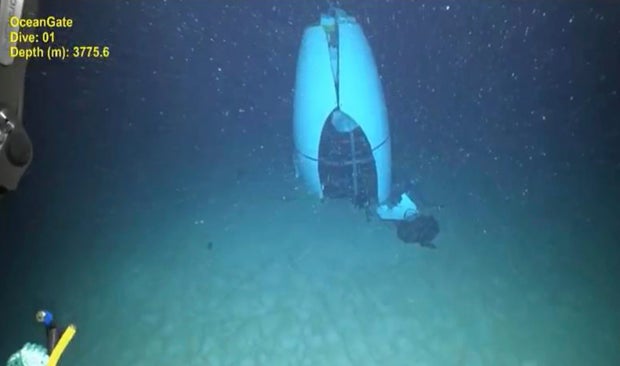Titan’s implosion was “expected by everyone who had access to a minimum of information,” the submersible pilot said.

A key employee of the company who owned the experimental submersible that imploded En route to the Titanic wreck, OceanGate fielded a question from a Coast Guard investigator who asked whether OceanGate felt a sense of “desperation” to complete the dives because of the high price. But a submersible pilot testified that there was “nothing unexpected” about the fact that The Implosion of Titan.
Amber Bay, chief administrative officer of the company that owns the Titan submersible, insisted Tuesday that the company would not conduct “dives that are risky just to meet a need.”
But she agreed that the company wanted to meet the expectations of those who paid $250,000 and were encouraged to participate as “mission specialists.”
“There was certainly an urgency to deliver on what we had proposed and a dedication and perseverance to that goal,” she told a Coast Guard panel.
Co-founder of OceanGate Stockton Rush was one of five people who died when the submersible implosion occurred in June 2023.
The Coast Guard opened a public hearing earlier this month as part of a high-level investigation into the cause of the implosion. Some testimony focused on the problematic nature of the enterprise.
On Tuesday, Bay responded to testimony from Antonella Wilby, a former OceanGate contractor, who said Bay told her “you don’t seem to have an explorer mindset” after she raised safety concerns. Bay said Wilby’s concerns were acknowledged at the time and treated with respect. Bay added that his own duties did not include engineering or operations.
She then burst into tears as she spoke of the tragedy, which was personal because she knew the victims.
“I had the privilege of knowing the lives of the explorers who lost their lives,” Bay said through tears. “And not a day goes by that I don’t think about them, their families and their loss.”
Earlier in the hearings, OceanGate’s former chief operating officer David Lochridge He said he often clashed with Rush and felt the company was only interested in money. “The idea behind the company was to make money,” Lochridge testified. “There was very little science.”
Lochridge and other witnesses painted a picture of a company eager to launch its unconventionally designed vessels. The accident sparked a global debate about the future of private underwater exploration.
On Tuesday, Karl Stanley, a submersible pilot and designer with the Roatan Seabed Exploration Institute, testified to give his perspective on deep-sea submersible operations and safety. He said the phenomenon of “billionaires courting scientists” has upended the economics of the industry.
Stanley also said he viewed OceanGate’s characterization of paid passengers as “mission specialists” as an attempt to avoid accountability.
“This is clearly a dodge to circumvent U.S. passenger regulations,” Stanley said.
Additionally, “the company’s business plan made no sense,” Stanley said. He also said he believes the implosion ultimately stemmed from Rush’s desire to leave his mark on history.
“There was nothing unexpected about this. It was what anyone who had access to a minimum of information expected,” Stanley said.
Stanley testified that he had previously made a test dive with Rush in one of his submersibles in the Bahamas, WCIV-TV reported.
“I was the first one to drive, but he insisted. It was his idea, nobody asked him to drive, he had each of us drive, and I think it was his weird way of doing it, like we imploded, we were kind of in control of our own destiny,” Stanley said, according to WCIV.
The hearing is expected to continue through Friday and include several other witnesses, some of whom are closely tied to the company.
“This cannot be the end of deep ocean exploration”
Businessman Guillermo Sohnlein, who helped found OceanGate with Rush, said in testimony Monday that he hoped the silver lining of the disaster would be that it would inspire renewed interest in exploration, including the deepest waters of the world’s oceans.
“This cannot be the end of deep-sea exploration. This cannot be the end of deep-sea submersibles and I don’t believe it will be,” he said.
Coast Guard officials stressed at the start of the hearing that the submersible had not undergone an independent review, as is standard practice. That and Titan’s unusual design have subjected it to intense scrutiny from the underwater exploration community.
OceanGate, based in Washington state, suspended operations following the implosion. The company currently has no full-time employees, but it was represented by an attorney at the hearing.
During the submersible’s final dive, on June 18, 2023, the crew lost contact after exchanging text messages about the Titan’s depth and weight as it descended. The support vessel Polar Prince then sent repeated messages asking if Titan could still see the ship on its onboard display.
When the submersible was reported overdue, rescuers rushed ships, aircraft and other equipment to an area about 700 kilometres south of St. John’s, Newfoundland. The wreckage of the Titan was later found on the ocean floor about 300 metres from the Titanic’s bow, Coast Guard officials said. No one on board survived.
At the hearing, the Coast Guard released new images showing the remains of the submersible on the ocean floor more than 12,000 feet underwater.
Pelagic research services via AP
OceanGate said it has fully cooperated with the Coast Guard and NTSB investigations from the beginning. Titan has been making trips to the Titanic wreck site since 2021.
Besides Rush, the implosion also killed veteran Titanic explorer Paul-Henri Nargeolet, two members of a prominent Pakistani family, Shahzada Dawood and his 19-year-old son Suleman Dawood, and British adventurer Hamish Harding.
Last month, Nargeolet’s family filed a $50 million claim. wrongful death lawsuit against OceanGate. Known as “Mr. Titanic,” Nargeolet participated in 37 dives at the Titanic site, the most of any diver in the world, according to the complaint.




